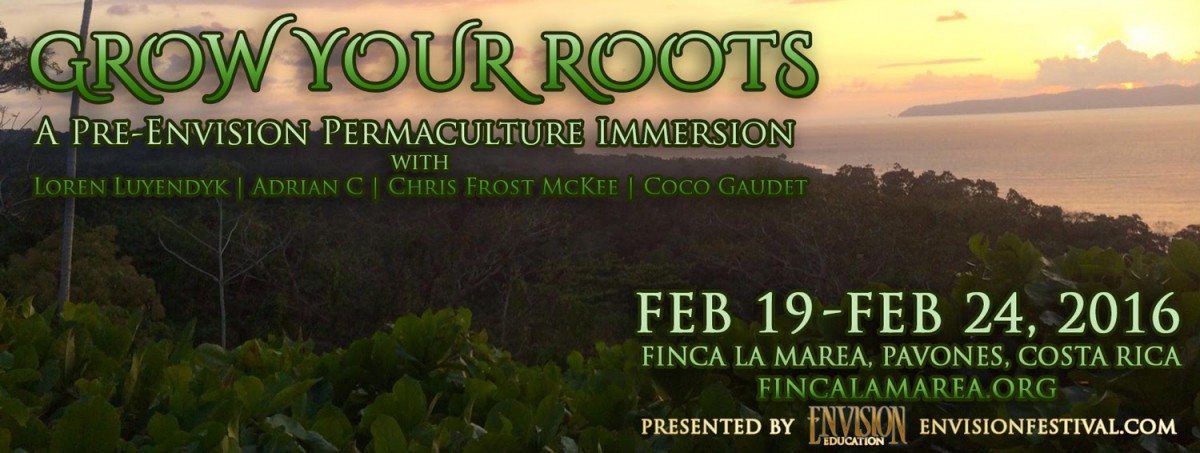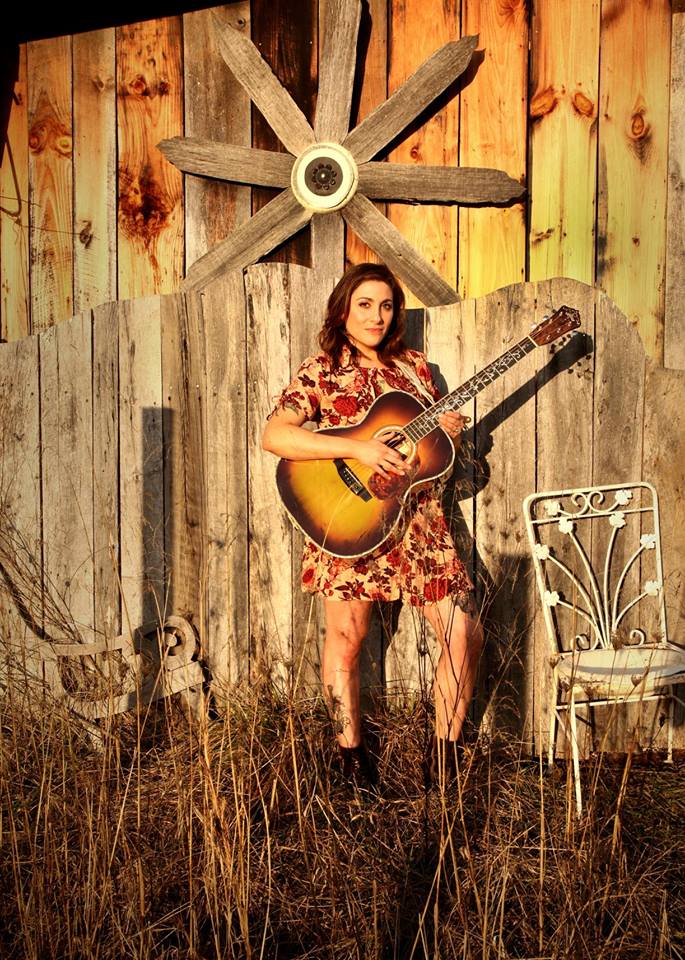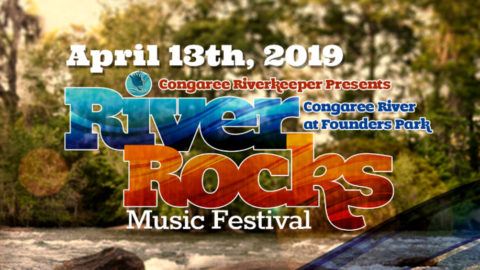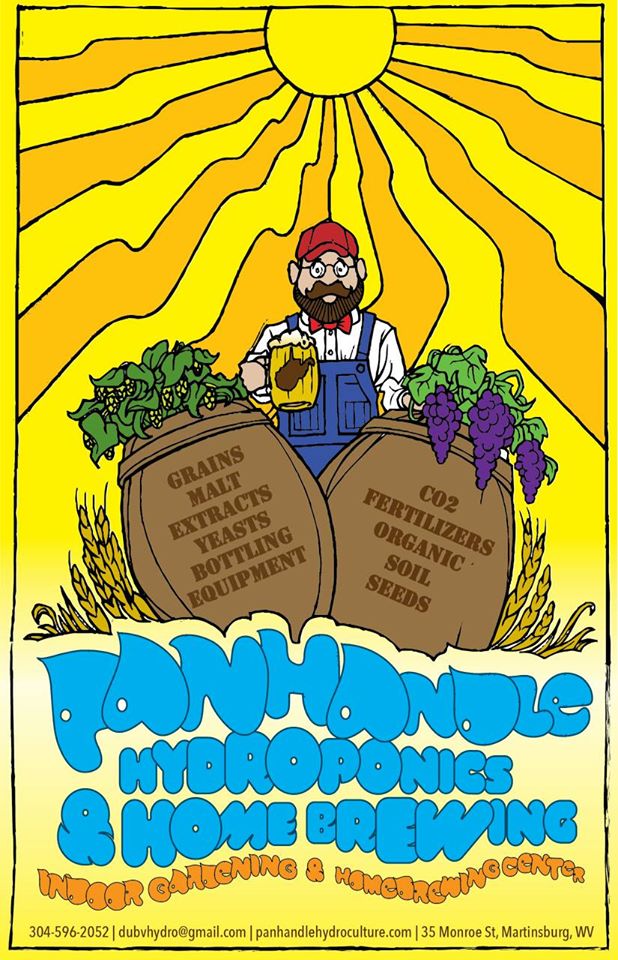Grow Your Roots: Ecology and Regenerative Living –
Envision Educational Retreat Series
Feb 19th – 24th, 2016
By Ashleigh S. Hackett
Beyond the reach of the lineup of music, yoga and guest speakers in Uvita, Costa Rica this February, Envision Festival now seeks to offer an extension to the lifestyle festival to connect further with an international audience. With the launch of a series of 5 educational retreats, a brand new blooming branch of Envision Productions aimed at bringing lifestyle change in everyday living for people through immersions, retreats and trainings. A pre-festival retreat at Finca La Marea in Pavones, experience immersion and exploration of conscious living and delve into the natural treasures of Costa Rican ecology while learning the principles and applications of permaculture in Grow your Roots on february 19th-24th, 2016 by the renowned educator Loren Luyendyk, founder of Surfers Without Borders.
- Tell us briefly what you will be doing in Costa Rica Feb 19-24th! Have you done a workshop like this before? If so, what should one expect?
I will be the lead facilitator for an Introduction to Permaculture workshop. Permaculture is a design process for creating regenerative human systems. This means that we design systems to provide our basic needs like water, food, and shelter, while restoring ecosystems, economic systems, and social systems.
I have taught several Introduction to PC workshops, and I can assure you that this will be unique, as they all are. Participants can expect to have their worldviews challenged, in a gentle way. We will look into where we are at ecologically as a planet, and how we can change the way we do things fundamentally to reverse the trend of degeneration.
- What is one of your proudest moments in your career as an advocate for community and regeneration as far as eco-conscious living goes?
My proudest moment to date was winning a contest from Keen footwear for a project to promote Permaculture through surfing. My wife and I created the non-profit Surfers Without Borders and traveled from our home in Santa Barbara California to Southern Nicaragua and back, surfing and learning along the way. We thought that we would be “teaching” and I suppose we did a bit of that, but really we learned a lot more than we taught.
While the non-profit is no longer active, we had some great moments sharing our experiences with our community through events. We also made a short movie about the trip and one friend told me after “That was the best surf movie I have ever seen.” That felt good.
- How did your interest in botany and love of ecology begin to flourish into a career? When and why did you begin this teaching?
My last year of college I was able to do an exchange in New Zealand to study Botany. I loved NZ so much that all I wanted to do was return, and soon after graduating I had an opportunity to travel back to NZ through Antarctica for work, which would give me a 9 month visa to NZ. My one requirement to myself was that I wouldn’t go unless I go the job running the hydroponic greenhouse in McMurdo Station on Ross Island Antarctica.
Well I got the job, and while I was down there I heard of this design system called permaculture. The concept that Antarctica could be the best place to test out closed loop systems was a new one to me, and I ran with this concept, mainly because everything that was done down there is about as unsustainable as possible- so I really was just bucking the system that was pretty short sighted (like shipping everything in and out including diesel fuel to power the base when the sun shines 24/7).
After my stint in Antarctica I returned to NZ with this new way of looking at things, and promptly took my first Permaculture Design Certification course (PDC) there in 1999. I returned home and started working doing landscaping and organic farming, took more classes and PDC’s, and after about 10 years of hands-on experience I felt that I had enough knowledge of how these ecological systems work that I could “teach” it. I put “teach” in quotations because I always learn so much myself by “teaching”.
- Why do you think it’s important to teach these principles that you have learned and practice yourself to others? What are some goals that you have for the participants at the pre-Envision Retreat in Costa Rica?
Understanding and sharing the concepts and principles of Permaculture are important because we as a species have really caused a lot of damage to ecosystems and human (sic social) systems in a very short time, basically since the Industrial Revolution- like 100 years. Most of the indigenous peoples of the world knew how to live in harmony with the natural world, and were able to coexist for millennia without any real detrimental impact. In some cases they actually improved their environment through management.
My goals for the participants of the workshop, is that they embrace this way of living as a lifestyle and actually integrate it into their daily lives. I truly believe that there are so many opportunities out there to create right “thrivelihoods” doing permaculture work that I would love to see people who have day jobs quit those and pursue what they are really passionate about. I find that most people are passionate about something within permaculture because it pretty much covers everything, and also this way of thinking really changes your being because it promotes ethics, unlike most design processes. The ethics of permaculture are Care for the Earth, Care for People, and Fair Share. Nobody can really argue with those ethics as guiding principles for living.
- What kinds of specific eco friendly initiatives can people take with them from the retreat in Costa Rica ? Do you think any of them can also be done in an urban environment?
Absolutely the permaculture principles can be applied to any context, scale, climate, situation etc. That is the beauty of permaculture- it is a process not a recipe. You start with the Ethics, and then apply the principles, which are kind of like natural laws, in that they are immutable and independent of context. For example, one principle that gets a lot of flack is “The Problem is the Solution”. This may seem counterintuitive, but when you really look at it, it makes sense.
Take for example sewage pollution. This is a real problem, right? But it is actually an opportunity. Think of all the wasted nutrients in the form of sewage that go unused and end up in the ocean or waterways as pollution. So ideas like using sewage to generate methane and electricity can actually turn that problem into a solution. You end up getting a double return really, by harvesting the sewage you get electricity and also reduce pollution.
- I see that you’ve studied in places like Australia, which are known to be a bit ahead of the US in terms of practicing better principles of an eco friendly life. Why do you think that is? Do you think the change will be harder or easier in places like cities as opposed to rural life?
The main restriction we have in the USA are regulations, and Australia has addressed this and changed some of their regulations to support sustainability and permaculture. That said Australia is moving fast towards our model of Idiocracy, with premiers like Tony Abbot who was basically like GW Bush, bought and sold by the corporations. That really is the root of the “problem”- corporations lobby politicians (and bribe them) to make sustainability illegal, because there is no money in it for them. They would have nothing to sell if everyone supported all their needs, so they really stand to lose the most with this kind of movement.
The cities are the new frontier, with the majority of the population now living within them. They also are the largest consumers of resoruces and also the largest sources of pollution. So really the greatest opportunity for permaculture is in redesigning our cities to be closed loop.
- What specific principles and applications do you hope people who take your workshop take with them?
I think I will use the principle I stated above, “The Problem is the Solution” because I think a lot of people are stuck in the problem mentality, which can be really debilitating. You can be frozen with apathy, thinking there is no hope. It really is based on fear and scarcity, which is not our natural state of being.
So hope is really what I hope people take home with them. Hope that we can solve the problems and turn them into solutions, in fact create an even better society and culture and ecosystems than existed before.
- Do you see this becoming ore widespread in the US and/or the world in western culture? Do you see the movement becoming more popular especially amongst children/youth?
I do, exactly because of what I said in the last question. Kids nowadays are bombarded with an apocalyptic reality that is pretty scary really. They are looking at climate change, pollution, no jobs, mass shootings, and probably thinking: “What is it all about?” I don’t blame them actually- they have every right to feel this way, and to be angry.
So that is where we come in, to give them a ray of sunshine in the midst of clouds, again hope. And these kids are brilliant, and have way more potential than any of us do, mainly because they have access to almost anything instantaneously via the internet. The challenge is getting them to get dirty….
- What does a typical morning look like for you? A typical evening?
I am pretty lucky to have a lot of free time. I have designed my life over the last 15 years to have a flexible schedule, so I can do pretty much what I want most mornings. This includes getting up and feeding the chickens and my cats, making breakfast from the eggs they laid, and working in the garden or going surfing if its good.
I do also have to work… I am doing more design and consultation remotely so I can work from home a lot. I do also have a few jobs where I visit the site and consult for designs, or do project management.
I also have a young daughter so this is pretty much why I have designed my life to work from home, so I can be around her as much as possible during her formative years, which is pretty fun.
A typical evening looks like us having dinner, then reading some books with my daughter until she goes to sleep, then working on designs or emails.
- For readers far away your retreats, or unable to afford going, what are some advice that can get people inspired and encouraged to practice and seek out a more eco-conscious lifestyle? How accessible would you say urban gardening is to most, and if not, how can people get more proactive about it?
I would say to start with your food. Try and find someone who grows it near you in a good way, meaning they don’t ruin the land they are on growing food. This is possibly the most impactful way we can make change- by voting with our dollar. Every dollar you spend on junk or GMO food just feeds those corporations that don’t really care about you or the earth.
You don’t necessarily have to be a farmer to live an eco-conscious lifestyle, but it helps. Knowing your farmer is a close second. That said if 10% of us produced enough food to feed 10 people we would put Monsanto out of business pretty fast.
- What is an example of a principle of permaculture design someone can put to practice in their homes today?
“Obtain a Yield” is a good one. Think about how you interact with your landscape and your home and how can you obtain a yield from it? For example, planting a garden is a simple solution, or putting solar panels on your roof. Better yet install some rainwater tanks or rain gardens to harvest the rain, which is the fundamental foundation for all life- water.
- Where would you like to see the progress in 10 years as far as eco friendly living goes? 50?
I would like to see our civil engineering shift from sending water away to harvesting it. I would love to see food growing in every nook and cranny, fruit trees in public parks, etc. The next level is to deal with our home and buildings- to use more natural materials like cob and adobe or straw bale.
But these are the visible structures, and the underlying invisible structures are where more profound shifts are needed. We need to shift our whole concept of how to relate to the world and look at ourselves as stewards rather than harvesters.
The crux of all eco-friendly living is community. It is really hard to get anything done without people, unless you throw a bunch of money at it. Community is the foundation for all culture, and we can’t create a permanent culture without building a solid foundation of community first. So I would say that my ultimate vision for society is to see people working together on common issues, instead of using those issues to divide us.
After all, we are all in this together- so lets have fun while we do epic work!
In addition to working on a farm and learning the principles of permaculture design, attendees will also get the opportunity to prep their minds and bodies with yoga, surfing, massage, and fresh delicious foods right from the farm. Tickets for the retreat will include 5 nights accommodations on the farm, 3 meals per day , transportation from San Jose to Finca La Marea and shuttle service to Envision early arrival is a MUST purchase 4-day pass). The aims of the Envision retreats are also to uphold and embody the Envision values of community, art, music, movement, wellness and regenerative design in a more intimate setting. Globally recognized educators come together in this pristine tropic setting to provide real tools for change that nourishes both the spirit and the land through creativity, intentionally gathering and making lasting connections. Hopefully through our outreach and intentional reporting of information and writing we can also help to spread these principles of regenerative living, to Envision and beyond….







